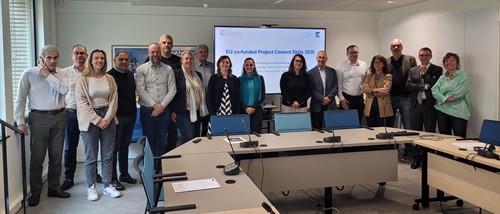EU Skills
The European cement industry's commitment to achieving carbon neutrality by 2050 will have significant implications for future workforce profiles and skills.
The transformation of our industry, its attractiveness, and the ensuing need for reskilling and upskilling of the workforce are pressing issues that we aim to address. In this context, we aim to emphasize the role of EU initiatives and funding in bolstering skills development across Europe. The year 2023 was designated as the EU Year of Skills, reflecting the sector’s needs and shared ambitions. It presented a valuable opportunity to exchange on current employment barriers ranging from workforce and skills shortage to language and transport infrastructure, access to funding, and cooperation with academia, authorities, and trade unions, among others.
Cultivating a workforce equipped with the skills required for the sector’s transformation will not only contribute to sustainable growth and foster greater innovation, but it will also enhance companies’ competitiveness. This aligns with the aspirations, involvement, and wellbeing of workers.
EU co-funded project 2023-2025
EFBWW and CEMBUREAU deepen their cooperation and develop a pathway towards establishing structures that will ensure a proper social dialogue for the sector at the European level. The objective is to address jointly the future challenges and develop common approaches and strategies for the green transition of the cement sector.
The industrial transformation to a carbon neutral economy will affect the way cement will be produced in the future and the production capacity. New technologies and production processes will need to be introduced. All this is foreseen to have an impact on employment in the cement sector, and on skills and qualifications of employees.
Therefore, EFBWW and CEMBUREAU have started a two-year EU co-funded common project on mapping skills’ needs for 2030-2050 in the cement sector. As part of the “Cement Skills 2030” project, EFBWW and CEMBUREAU commissioned the German Cement Association (VDZ) to assess the evolving skills landscape in the cement industry. The study, presented in December 2024 in Brussels, examines how the sector’s decarbonisation pathway will transform job profiles and skills requirements by 2050. The study mainly focused on 6 case study countries namely Belgium, France, Germany, Greece, Poland, and Spain; alongside other Member States who responded on voluntary basis. Drawing from EU policy developments and technological shifts, the report provides critical insights that have led to form a set of joint policy recommendations to be launched at a hybrid conference on 27 May 2025. Please click here to access the full study.
